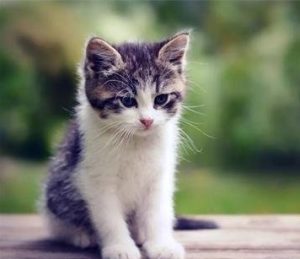Pet owners need to keep an eye on their cat’s health if they wish to see their feline friends live a long and healthy life. The best way to do this is to observe their eating habits and waste patterns. Owners should also check their cat’s body every two days for anything strange. If a cat starts to dislike being touched, it could be a sign that something is wrong and owners need to pay more attention.
1.Pus-like nasal discharge
If your cat has a nose that’s making snuffling sounds, is discharging pus-like nasal mucus, or has a dry nose, it might have “rhinitis”. It could be infected with a contagious respiratory disease or sinusitis. If left untreated, it will gradually develop into nasal discharge. Also, a dry nose may indicate that the cat has a feverish disease or other contagious diseases. However, a dry nose during or after sleep is normal.
2.D Doesn’t like to be held
If the abdomen is swollen, it could be due to pyometra, which causes pus to accumulate in the uterus, or kidney tumors, liver cirrhosis, liver cancer, infectious peritonitis, purulent peritonitis, heart failure, etc. If the abdomen is not swollen but the cat doesn’t like its belly to be touched, it could be steatosis or urinary stones. If there is a lump in the abdomen, especially around the mammary glands, even if it doesn’t hurt when touched, it could be a mammary tumor and should not be taken lightly.
3.Frequent and prolonged trips to the litter box
If the color of the feces is different from usual, it could be a sign of illness. For example, if accompanied by bloody, reddish feces, it could be hemorrhagic enteritis. If the hardness is normal but mixed with blood, it is likely due to ulcers in the rectum or large intestine. If the feces are yellow, it indicates an excessive intake of plant-based foods and insufficient intake of animal-based foods required by cats. If the feces are grayish-white, it could be due to the excessive intake of calcium, bones, or abnormal bile secretion.
4.Eyes won’t open, constantly pawing at them
If a cat’s eyes show the white membrane of the conjunctiva, owners should watch out for signs of diarrhea or loss of appetite in their cats, as the conjunctiva only appears when the cat is unwell, indicating that the eyes are a barometer of a cat’s health.
5.Frequent scratching of the body
The presence of dandruff may be due to skin problems caused by scabies, allergic dermatitis, nutritional disorders, etc. If there is hair loss around the head and neck, it is likely to be ringworm. Symmetrical hair loss on both sides may be caused by hormonal imbalances. In addition, dry, rough, and dull fur may be due to insufficient intake of vitamins, fats, and proteins. However, in general, the fur of older cats tends to be drier, which is somewhat inevitable.
6.Frequently shaking head and scratching ears
If there is black earwax, it could be due to ear mites or external otitis caused by fungi. Ear mites can cause intense itching in the ears, leading cats to frequently shake their heads or scratch their ears with their paws. If the ear flap of a cat swells and becomes as elastic as a balloon, it’s an ear hematoma.
In daily life, pet owners should meticulously monitor any changes in their cat’s health. Timely detection and treatment are crucial. Never let carelessness lead to a delay in your cat’s medical care!
In addition to these signs, other changes in a cat’s behavior or physical condition can also indicate health issues. For example, a significant increase or decrease in water intake may signal kidney problems or diabetes. Sudden weight loss or gain can be linked to various diseases, including hyperthyroidism or gastrointestinal disorders. Lethargy or excessive sleeping may suggest pain, infection, or other systemic issues.
It’s also important to pay attention to a cat’s grooming habits. Cats are naturally fastidious creatures, so a lack of grooming and a matted or unkempt coat can be a sign of illness or discomfort.
If you notice any of these signs or other unusual behaviors in your cat, it’s always better to err on the side of caution and consult with a veterinarian. Early diagnosis and treatment can significantly improve the outcome for many feline health issues. Regular veterinary check-ups, a balanced diet, and a stress-free environment are key to maintaining your cat’s overall well-being and ensuring a long, healthy life.

